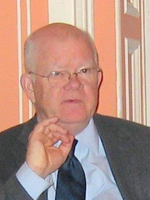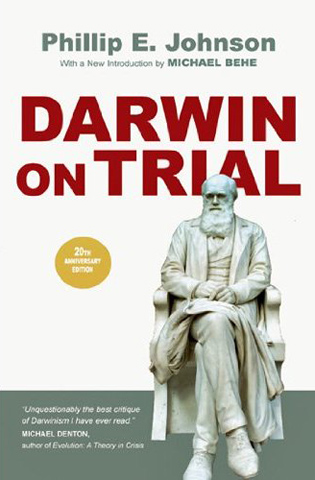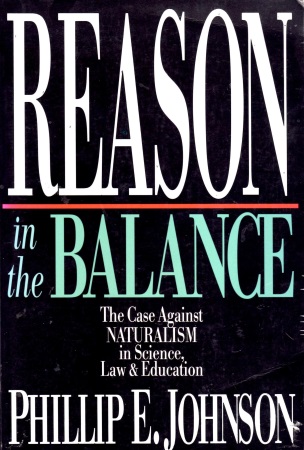Darwinism is Materialist Mythology, not Science
 This article is by Prof. Phillip E. Johnson, Prof Emeritus of Law, at the University of California, Berkeley, USA. Prof Johnson is generally regarded as ‘the Father of the Intelligent Design movement’ and we are grateful to him for permission to reprint this article. His book ‘Darwin on Trial’ (IVP 2004) gave a devastating critique of Neo-Darwinism and opened a door for the development of the evidence-based scientific theory of Intelligent Design. This essay by Prof Johnson is worthy of your careful perusal. It first appeared in Elim’s Direction Magazine in October 2004.
This article is by Prof. Phillip E. Johnson, Prof Emeritus of Law, at the University of California, Berkeley, USA. Prof Johnson is generally regarded as ‘the Father of the Intelligent Design movement’ and we are grateful to him for permission to reprint this article. His book ‘Darwin on Trial’ (IVP 2004) gave a devastating critique of Neo-Darwinism and opened a door for the development of the evidence-based scientific theory of Intelligent Design. This essay by Prof Johnson is worthy of your careful perusal. It first appeared in Elim’s Direction Magazine in October 2004.
British newspaper readers know that Richard Dawkins, with his allies in the press and among the liberal clergy, has been waging a strident attack upon schools sponsored by the Christian Vardy Foundation. No one disputes that those schools are successful in motivating and educating youngsters whom other schools have failed, but that does not matter to the more fanatical Darwinists, who accuse the schools of exposing their pupils to creationist dissent from Darwinism, and demand that this heresy be stopped, no matter how good a job the schools are doing in other respects. This tumult raises the question: why are the Darwinists, who dominate the press and all other educational institutions, so worried? Why aren’t they confident that they can easily counteract the effects of any skepticism towards their theory that might be encouraged at a few schools?
 The root of the problem is that ‘science’ has been given two contradictory definitions in modern culture. On the one hand, science refers to a method of investigation involving procedures like careful measurements and repeatable experiments. Science by definition requires investigators to maintain a skeptical attitude, insisting that all claims be carefully tested. That requirement of unbiased testing should extend to the central Darwinist claims that some combination of chance and physical law is sufficient to cause life to emerge spontaneously from non-living chemicals, and that the Darwinist mechanism of random genetic variation and natural selection is capable of designing complex organs such as brains and vision systems. There is no proof that natural selection - or any law/chance combination- has any of the creative power Darwinists claim for it. Dawkins concedes that even the simplest living organisms contain immense amounts of genetic information, and natural selection has no demonstrated information-creating power.
The root of the problem is that ‘science’ has been given two contradictory definitions in modern culture. On the one hand, science refers to a method of investigation involving procedures like careful measurements and repeatable experiments. Science by definition requires investigators to maintain a skeptical attitude, insisting that all claims be carefully tested. That requirement of unbiased testing should extend to the central Darwinist claims that some combination of chance and physical law is sufficient to cause life to emerge spontaneously from non-living chemicals, and that the Darwinist mechanism of random genetic variation and natural selection is capable of designing complex organs such as brains and vision systems. There is no proof that natural selection - or any law/chance combination- has any of the creative power Darwinists claim for it. Dawkins concedes that even the simplest living organisms contain immense amounts of genetic information, and natural selection has no demonstrated information-creating power.
That lack of proof should be enough to discredit Darwinism, except that the second definition of science comes to the theory’s rescue by dispensing with the need for proof. Science has become identified with a philosophy known as materialism, or naturalism. This philosophy insists that nature is all there is, and nature is made up of particles. It follows that matter had to do its own creating, and that the means of creation must not have included a role for anything outside of nature, such as God. Scientists guided by this second definition are not permitted to approach materialism with open minds or skeptical questions, but must believe it on faith and consider no objections. If materialism is true, then something at least roughly like Darwinism must also be true as a matter of logic, because materialist science has no viable alternative. Scientific inquiry is limited to the details, because the fundamental points are all decided by defining ‘science’ as applied materialist philosophy.
 The reason the theory of evolution is so important to society is that it is the main scientific prop for a godless philosophy that either repudiates Christian theism or confines it to the marginal realm of subjective personal experience that has no standing as public knowledge. Students first learn to recite that ‘evolution is a fact,’ and then they gradually learn more and more about what that ‘fact’ means. It means that all living things are the product of mindless material forces such as chemical laws, natural selection, and random variation. That means that God is out of the picture, and humans (like everything else) are the accidental product of a purposeless universe. It is futile for Christians to try to reconcile their faith with Darwinist claims by imagining that natural selection is God’s means of creating, because the claim that natural selection has creative power is derived not from impartial testing of evidence, but from a materialist philosophy that excludes God by definition.
The reason the theory of evolution is so important to society is that it is the main scientific prop for a godless philosophy that either repudiates Christian theism or confines it to the marginal realm of subjective personal experience that has no standing as public knowledge. Students first learn to recite that ‘evolution is a fact,’ and then they gradually learn more and more about what that ‘fact’ means. It means that all living things are the product of mindless material forces such as chemical laws, natural selection, and random variation. That means that God is out of the picture, and humans (like everything else) are the accidental product of a purposeless universe. It is futile for Christians to try to reconcile their faith with Darwinist claims by imagining that natural selection is God’s means of creating, because the claim that natural selection has creative power is derived not from impartial testing of evidence, but from a materialist philosophy that excludes God by definition.
All the most prominent Darwinists proclaim atheism when they are not trying to disarm the religious people with illusory reassurances. Carl Sagan had nothing but contempt for any who deny that humans and all other species ‘arose by blind physical and chemical forces over eons from slime.’ Richard Dawkins exults that Darwin ‘made it possible to be an intellectually fulfilled atheist,’ and Richard Lewontin has written that scientists must stick to philosophical materialism regardless of the evidence, because ‘we cannot allow a Divine Foot in the door.’ Stephen Jay Gould condescendingly offered to allow religious people to express their subjective opinions about morals, provided they don't interfere with the authority of scientists to determine the ‘facts’ - one of the facts being that God is merely a comforting myth.
There are a lot of dissenters, and there would be many more if people were not intimidated by the mystique of ‘science’ and by the bullying of Darwinists like Richard Dawkins. Sagan deplored the fact that ‘only nine percent of the American public accepts the central finding of biology that human beings (and all the other species) have slowly evolved from more ancient beings with no divine intervention along the way.’ To keep the other 91% quiet, organizations like the U.S. National Academy of Sciences periodically issue statements about public school teaching which contain vague reassurances that ‘religion and science are separate realms,’ or that Darwinism is consistent with unspecified ‘religious beliefs.’ (British Darwinists see less need to mollify the Christians, and hence dare to be more explicit about their atheism.)
 What the reassuring statements mean is that the realms are separate because science discovers facts and religion indulges fantasy. The acceptable religious beliefs the materialists have in mind are of the naturalistic kind that do not include a supernatural creator who might interfere with evolution or try to direct it. A great many of the people who do believe in such a creator have figured this out, and in consequence the reassurances merely insult our intelligence.
What the reassuring statements mean is that the realms are separate because science discovers facts and religion indulges fantasy. The acceptable religious beliefs the materialists have in mind are of the naturalistic kind that do not include a supernatural creator who might interfere with evolution or try to direct it. A great many of the people who do believe in such a creator have figured this out, and in consequence the reassurances merely insult our intelligence.
One reason the Darwinist educators panic at the first sign of public rebellion is that they fear exposure of the implicit religious content in what they are teaching. An even more compelling reason for keeping the lid on public discussion is that the official neo-Darwinian theory is having serious trouble with the evidence. This is covered over with the vague claim that all scientists agree that ‘evolution has occurred.’ Since the Darwinists sometimes define evolution merely as ‘change,’ and lump minor variation with the whole creation story as ‘evolution,’ a few trivial or misleading examples like dog-breeding or fruit fly variation allow them to claim proof for the whole system. The really important claim of the theory - that the Darwinian mechanism does away with the need to presuppose a creator - is protected by a semantic defense-in-depth that conceals the lack of genuine supporting evidence.
Here is one example of how real science is replaced by flim-flam. The standard textbook example of natural selection involves a species of finches in the Galapagos, whose beaks have been measured over many years. In 1977 a drought killed most of the finches, and the survivors had beaks slightly larger than the previous average. The probable explanation was that larger-beaked birds had an advantage in eating the last tough seeds that remained. A few years later there was a flood, and after that the average beak size went back to normal. Nothing new had appeared, and there was no directional change of any kind. Nonetheless, that is the most impressive example of natural selection at work that the Darwinists have been able to find after nearly a century and a half of searching.
To make the story look better, the US National Academy of Sciences removed some facts in its 1998 book on how to teach evolution. This version omits the flood year return-to-normal and encourages teachers to tell their pupils that a ‘new species of finch’ might arise in 200 years if the initial trend towards increased beak size continued indefinitely. When our leading scientists have to resort to the sort of distortion that would land a stock promoter in prison, you know there must be something wrong with their science.
If the Darwinists wanted to teach scientific investigation, rather than to indoctrinate, they would encourage students to think about why, if natural selection has been continuously active in creating, the observed examples involve only very limited back-and-forth variation that doesn't seem to be going anywhere. They also would acknowledge that the fossil record overall is difficult to reconcile with the steady process of gradual transformation predicted by the neo-Darwinian theory. Given these evidentiary problems and others, how impressive would the evidence for Darwinism look if we did not assume at the start that nature had to do its own creating, so a material creation mechanism simply has to exist regardless of the evidence? That is the kind of question the Darwinists don't want to encourage students to ask, so they impose rules that make it effectively impossible to challenge their theory and hope the public never learns to see through the smoke screen.
Copyright Prof Phillip E Johnson August 2004.
Printed with permission of and thanks to Elim’s Direction Magazine and New Life Publishing.
Image credits:
Thumbnail - © IVP Books
Phillip Johnson - © Centre for Intelligent Design
Darwin on Trial - © IVP Books
Reason in the Balance - © Inter-Varsity Press (US)
The Right Questions - © Inter-Varsity Press (US)